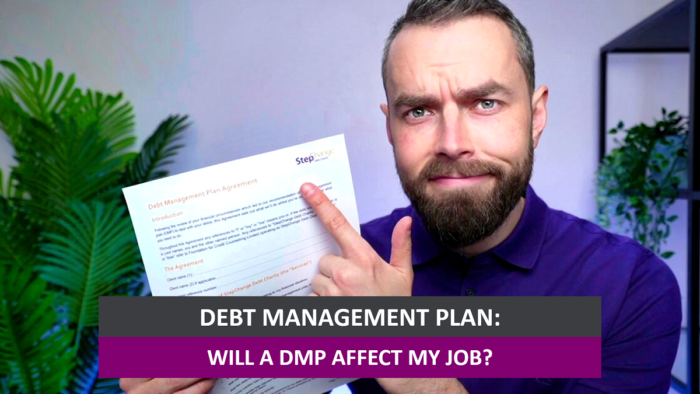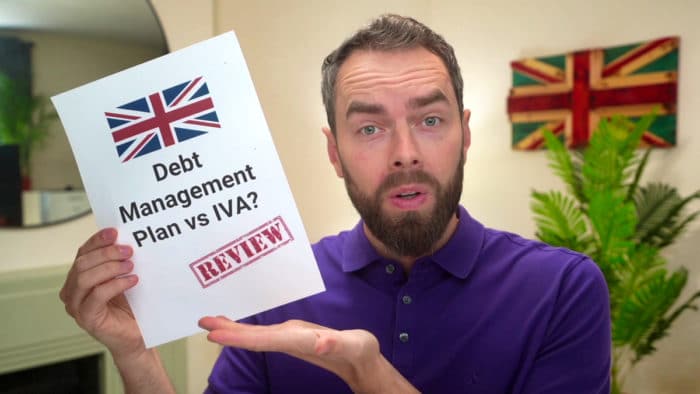Will a Debt Management Plan (DMP) Affect My Job?
For free & impartial money advice you can visit MoneyHelper. We work with The Debt Advice Service who provide information about your options. This isn’t a full fact-find, some debt solutions may not be suitable in all circumstances, ongoing fees might apply & your credit rating may be affected.

For free & impartial money advice you can visit MoneyHelper. We work with The Debt Advice Service who provide information about your options. This isn’t a full fact-find, some debt solutions may not be suitable in all circumstances, ongoing fees might apply & your credit rating may be affected.
If you are thinking about starting a Debt Management Plan (DMP) but are worried about how it might affect your job, you’ve come to the right place.
Every month, over 170,000 people visit our site looking for guidance on debt solutions.
In this article, we’ll cover:
- What a Debt Management Plan is and how it works
- Whether your employer will find out about your DMP
- If you can still enter a DMP if you’re a boss at a company
- The good and bad parts of a Debt Management Plan
- Other ways to deal with debt that you can’t pay back
Dealing with debt can be challenging, and it’s common to feel unsure about seeking help. In fact, Citizens Advice revealed that 60% of adults facing financial difficulties hesitate to seek assistance.1
Some of us have been in your shoes, you’re not alone. We’re here to help you learn more about how a Debt Management Plan might affect your job.
Will My Employer be Informed?
» TAKE ACTION NOW: Fill out the short debt form
Can I Enter into a Plan if I’m a Company Director?
A Comparison of Debt Solutions
As mentioned earlier, it might be worth considering other debt solutions if you’re a director.
To assist you in making the right choice for your situation, I’ve put together this table comparing a Debt Management Plan with other debt solutions
| DMP vs Alternative Solutions | How It Can Help Tackle Debt | Suitable For Individuals… |
|---|---|---|
| Debt Management Plan (DMP) | An informal agreement to pay back non-priority debts in a more manageable way, but does not write off any debt. | …seeking a flexible arrangement without legal proceedings. |
| Debt Relief Order (DRO) | A formal solution that freezes debts for a year, after which they may be written off. | …with a total debt under £20,000, low income, and minimal assets, who cannot afford to pay off their debts. |
| Individual Voluntary Arrangement (IVA) | A formal, legally binding agreement that typically lasts for 5 years and can write off a portion of your debt at the end. Credit rating will be negatively affected. Homeowners can keep their home. | …with a larger amount of debt who can commit to a fixed repayment plan and want to avoid bankruptcy. |
| Bankruptcy | A formal legal process that writes off most debts but has significant consequences, including potentially losing your home and negatively impacting your credit rating and job prospects. | … with significant debts that cannot realistically pay them off. More severe option with substantial consequences. |
| Consolidation Loan | A consolidation loan involves taking out new credit to pay off existing debts. It can simplify payments and potentially reduce interest rates. But, you could also end up paying more interest overall. | .. with multiple debts looking to consolidate into a single payment, usually with a good credit score to obtain favourable terms. |
| Payment Holiday | Payment holidays offer short-term relief by pausing or reducing payments. Payment holidays don’t reduce the total debt amount and are usually for a short duration. | ..with short-term financial difficulties needing temporary relief from debt payments. |
| Equity Release | Equity release involves homeowners releasing equity from their property. It provides a lump sum or additional income by using the home’s value but reduces the property’s equity. | …with debts and want to unlock the value in their home to pay them off, reducing their property’s equity. (Ideally for older homeowners, usually 55+) |
| Informal Negotiation | Informal negotiation is not legally binding and involves negotiating with creditors for better terms. | …with debts and wish to negotiate terms independently and prefer to have a flexible, non-binding arrangement with creditors. |
How a debt solution could help
Some debt solutions can:
- Stop nasty calls from creditors
- Freeze interest and charges
- Reduce your monthly payments
A few debt solutions can even result in writing off some of your debt.
Here’s an example:
Situation
| Monthly income | £2,504 |
| Monthly expenses | £2,345 |
| Total debt | £32,049 |
Monthly debt repayments
| Before | £587 |
| After | £158 |
£429 reduction in monthly payments
If you want to learn what debt solutions are available to you, click the button below to get started.

